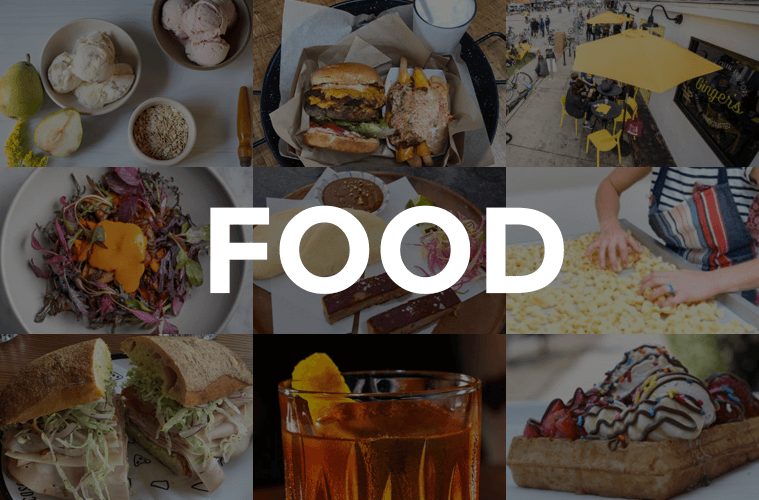Photos by Anne FishbeinAttari Sandwich Shop is a pleasant lunch spot hidden around the corner from Westwood’s Iranian strip, a short distance from the biggest concentration of bakeries and bookstores and boutiques of Iranian Los Angeles, in the small, green courtyard of a tiny office building, shaded with banana trees and small palms, tables arranged around a chattering fountain, bright flowers flowing from a balcony overhead. Busy Westwood Boulevard is only a few steps away, but time moves more slowly here at Attari, where the same clumps of people seem to have lunch together every day, loud Farsi discussions seem to have been continuing since the 1970s, and friends greet friends with shouts of surprise that do not begin to hint that the people are probably running into each other for the third time in a single week.
This may be one of the least expensive restaurants on the Westside, but the customers tend to be stunningly well-dressed, not the affluent American fresh-out-of-Saks look or the Los Angeles $800 sportswear thing, but more European, structured, as if the women as well as the men have more than a passing relationship with their tailors. Friday-afternoon lunch is a ritual all over Los Angeles, from Valentino to Spago to the Polo Lounge, but the women at Attari Sandwich Shop, with its lightweight patio chairs and its $4 bowls of soup, may be better dressed than the regulars at any of those fancier places. Most days, they may be the regulars at those fancier places.
The Friday-only special is marked as ab-goosht + goosht koobideh on the chalkboard when it is marked in English at all. Ab-goosht is the closest thing there is in the restaurant world to an automatic order, an intricate stew of lamb and vegetables and grain cooked for many hours and then mashed into a thick, homogeneous paste with the texture of refried beans, and an expressed liquid, the soul of the dish, that is served separately as soup. Rounds of pita bread, a plastic clamshell filled with fresh herbs, and little plastic salsa containers packed with pickled vegetables are served with the ab-goosht, which seems sometimes to be less a foodstuff than a ritual.
Everybody on the patio seems to be eating the dish differently. An elderly man tears pieces of bread into his soup and lets them soften before he sips the thick broth, ignoring the paste completely. A model-looking guy piles spoonfuls of the paste directly into the soup itself; his girlfriend carefully dribbles a few drops of the soup onto her paste, loosening the texture of the koobideh and smoothing it out with the back of her spoon before every bite. A woman wearing a suit that verges on couture sprinkles herbs onto her soup and nibbles at them as if they were a moist salad, alternating bites of mint and lemon basil with dainty chomps out of a raw onion.
The near-perfect Kuku sandwich
I experiment a little and come up with my own procedure, mounding the paste on scraps of torn pita, layering it with herbs and onion and the jammy mash of pickled vegetables, and dipping the folded packages into the broth as if it were lettuce-wrapped Korean barbecue. It seems to work just fine.
On other days, almost everybody has a bowl of barley soup, ash-joe, in front of them, a dense, turmeric-yellow concoction spiked with lentils and fresh, sour herbs, served in a pretty pottery bowl fitted into a drive-in-style plastic basket.
An Attari sandwich is close to a perfect thing, a length of toasted French bread, a layer of main ingredient, and a dressing that includes fresh tomatoes, a handful of shredded lettuce and a smattering of spiced, supertart Iranian pickles that somehow manage to give the impression of a good Vienna-style hot dog “dragged through the garden,” as they say on Chicago’s West Side. One of the sandwiches at Attari, the sosess, is in fact filled with something closely resembling (if not verifiably) hot dogs, packed together as a bundle, a hot dog sandwich with the taste of Tehran. Other sandwiches are made with thin, pounded chicken (kotlet); potato salad (oliveh); and kalbus, what the woman behind the counter describes as Persian mortadella. I am fond of the sandwich stuffed with a slice of kuku, a sort of herb-rich Iranian fritatta made with puréed greens and eggs that tastes like a great Italian sformato, the rich, pale lime-green of a vintage leisure suit but significantly more tasteful.
Attari Sandwich Shop, 1388 Westwood Blvd., Westwood; (310) 441-5488. Hours Tues.–Sun. 11 a.m.–6 p.m. Lunch for two, food only, $9–$18. No alcohol. Street parking only. Cash only. Recommended dishes: ash-joe, kuku sandwich, ab-goosht + goosht koobideh.
Advertising disclosure: We may receive compensation for some of the links in our stories. Thank you for supporting LA Weekly and our advertisers.

